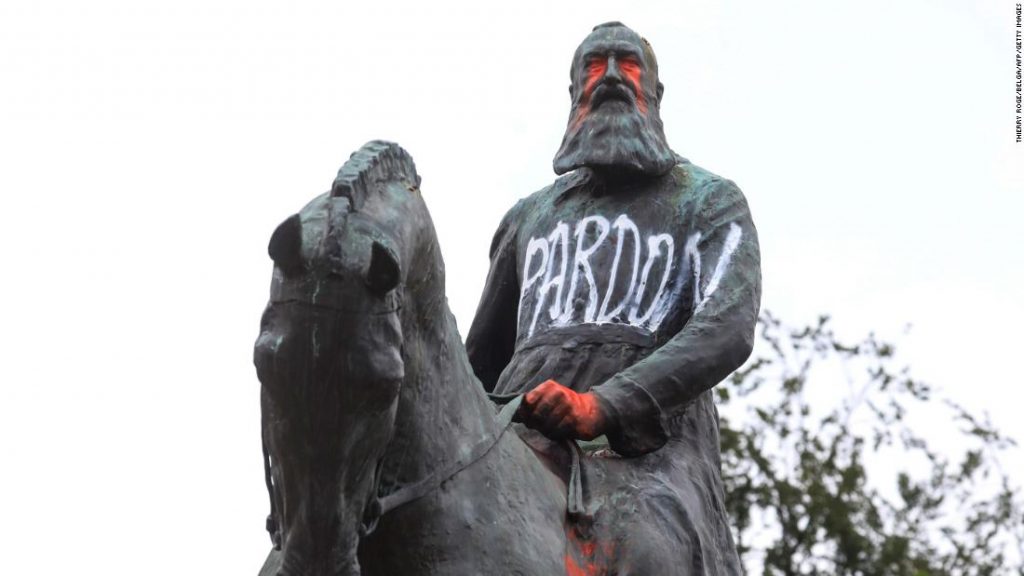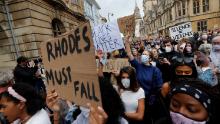
Protesters last weekend wrenched Colston’s statue from the plinth, rolled it down cobbled streets and tossed it into the very same waters on which his ships arrived hundreds of years ago, carrying shackled African men, women and children for him to sell on as slaves in the Americas.
Few Europeans will explicitly defend their country’s historical use of slavery, yet challenging the celebration of the very leaders and merchants who profited from slavery and the horrors of colonialism is proving a less comfortable conversation.
In Bristol, schools, streets, pubs and the main hall bear the name Colston, in celebration of the merchant’s philanthropy on which the city was built. Colston is as entwined with Bristol as Rockefeller in New York or Eiffel in Paris.
And therein lies the problem. It can be difficult for a people to acknowledge that national heroes also traded slaves, or held deeply racist views, or profited from oppressing other civilizations, perhaps even genocide.
“Walking past that statue every day, knowing that that’s a symbol of you being oppressed because of your immediate relationship with racism today — and your ancestors, family, in the past that have been oppressed and exploited and murdered, tortured and raped — is a great offense,” said Miles Chambers, Bristol’s first poet laureate, who addressed protesters last week.
He said people had been petitioning the council to bring it down for more than 20 years. “It needed to be ripped down and pulled down.”
It’s a sentiment that many people in the United Kingdom share. Even Bristol police chief Andy Marsh instructed officers to stand by and allow protesters to bring the statue down, something unlikely to have happened a month ago, before Floyd’s death.
But this sentiment is not shared by all, not least the country’s leader. The Conservative-led government responded to the statue’s toppling with the threat of force.
“I will not support or indulge those who break the law, or attack police or desecrate public monuments. We have a democracy in this country. If you want to change the urban landscape you can stand for election or vote for someone who will,” Prime Minister Boris Johnson said, adding that anyone attacking public property would “face the full force of the law.”
On Friday, Johnson joined a chorus of critics saying toppling statues was an attempt to erase British history, pointing particularly at protesters who had vandalized a statue of former Prime Minister Winston Churchill, widely regarded a hero for his leadership during World War II. Churchill was also known to hold racist views and protesters last week spray painted the words “was a racists” after his name.
But changes are happening around the country, even if they aren’t in Westminster.
On Wednesday, the Scottish Parliament unanimously passed a motion to establish a museum devoted to the history of slavery.
London Mayor Sadiq Khan has ordered a review to ensure landmarks fairly reflect the capital’s diversity and achievements. The opposition Labour Party had instructed its 130 local councils across the country to do the same.
And students at the University of Oxford have renewed protests demanding the removal of a statue of Cecil Rhodes — whose trust finances the well-known Rhodes scholarships — one of Britain’s most dedicated imperialists who was known to hold racist views.
Decolonizing Belgium’s streets
Statues have become a target in Belgium too. In the city of Antwerp, one of King Leopold II was so badly burned and defaced that authorities were forced to remove it. They plan to repair it and place it in a museum.
Across the country, the king is commemorated not only in statues but in the names of streets, buildings, squares and parks.
It’s difficult to understand how King Leopold II even came to be so celebrated in the country. He was regarded as one of the most brutal of Europe’s colonizers, even during his time, as he made an enormous swath of central Africa his personal piggy bank. He was not even backed by the Belgian government when he proclaimed the land for himself and named it, euphemistically, the Congo Free State. And despite the fortune he gained from the colony, the king never set foot in it.
The activist group Bamko-Cran of Congolese-Belgians wants all celebratory statues and references to King Leopold II in the country removed.
“We’ve been calling on political actors to do this type of thing for 30 years, and they did not understand or listen. It’s as if Germany and Germans decided to have statues of Hitler in all of their cities,” said the group’s president, Mireille-Tsheusi Robert.
“When we erect a statue that means that we applaud the actions of that person that is represented. That we are in agreement with their work. Here we are not in agreement with the genocide that Leopold II carried out in Congo,” she said.
But in recent years, there has been some renewed interest in the country’s colonial history and a collective memory is forming. A series of television documentaries on the subject was widely watched, a museum exhibiting colonial propaganda in Brussels has been renamed and reopened to tell a more accurate story of the time, and a square in the capital was in 2017 named after Patrice Lumumba, the DRC’s first prime minister, who was assassinated in a coup backed by Belgium.
Still, there are Belgians of prominence who want to keep the king’s statues standing.
“You only have to look at what King Leopold II has done for Belgium and you will understand,” he said.
But it’s easy to find holes in the arguments of such supporters. Yes, the British built a rail network in India, as is often pointed out. But it feels like a stretch to expect celebration for trains that were built to pillage the country, to transport its food for export as people there died in the millions in times of famine.
“Many people still have racist conceptions in saying that ‘you would have nothing, we brought you technology, we brought civilization,’ forgetting that there already was a civilization, simply a different one,” Robert said.
A black curriculum
Much of this positive take on colonialism can be found in the history lessons taught in schools.
In France — where Black Lives Matter protesters have used the death of George Floyd to address its own problems with police brutality — there has been continued debate on how colonialism should be viewed and taught.
The French held empires or colonies at several points since the 17th century, losing much of its overseas territory after World War II, particularly in Africa and Southeast Asia, as independence movements around the world gained force.
In 2005, the French parliament passed an education law, part of which obliged schools to include “positive aspects” of French colonialism in history lessons. The law was so controversial that President Jacques Chirac was forced to override it with a decree and the Supreme Court agreed the law shouldn’t determine how schools teach history.
Yet the conversation doesn’t appear to have gone much further since. The colonial period is a source of pride among a certain section of French society, who still like to think of France as something of a world power, according to Pap Ndiaye, a historian with The Paris Institute of Political Sciences.
“I would say that when reading conservative newspapers and listening to conservative politicians, you have this ambiguous discourse saying that, ‘yes, colonialism was not maybe a good idea, but colonialism brought good things overall and we should have a balanced and fair understanding of the French colonial past,” he said.
“Historians like myself, we do not say history is about a positive column here and a negative column there. It’s about the overall purpose of colonization, which was to exploit and dominate parts of the world, and when looking closely at the so-called good things that colonialism did, speaking of education, for example, a very small part of the colonized had access to education. And when it comes to medicine, it was first and foremost for the Europeans to survive in tropical areas, to fight tropical diseases, and also to allow Europeans to have manpower in colonized areas.”
He says there is also a fear in France that admitting to wrongdoing would lead to legal actions and “open a Pandora’s Box” of demands for reparations, which gives another incentive to carry on with this narrative of positive colonialism, Ndiaye said.
Very few European nations have paid compensation for human rights abuses or what were likely atrocities in their former colonies. In 2013, the UK agreed to compensate victims of torture at the hands of British colonial forces in Kenya during the Mau Mau uprising in the 1950s, to name a rare example. In 2011, the Dutch apologized and compensated the relatives of men and boys who were killed in a massacre in the Indonesian town of Rawagede.
In the UK, the issues of transatlantic slavery and the fall of the British empire are in the curriculum for history, but there is little oversight into the way those topics are taught, which often leads to a whitewashing of events, according to Sam Okyere, a sociologist from the University of Bristol, who studies the legacy of the slave trade.
Okyere points out that UK schools often focus on the success in abolishing of slavery in 1883, 15 years before France and 22 years before the United States. The government paid out huge sums of money in compensation to former slave owners to finally end the practice.
“There’s still is a lot of naivety and misunderstanding about it. So we have here in the UK, where government ministers would rather naively call on the British public to pat itself on the back for having paid for the liberation of slaves, when the reality was that slave traders and plantation owners were given compensation for the fact that they held slaves, even though those who were enslaved, or former enslaved peoples, were given no such compensation. So, there is a lot of collective, if you want, amnesia or deliberate or wilful ignorance about the past or the role Britain played in the transatlantic slave trade,” he said.
As the name suggests, her organization has created a curriculum on black British history, heavily focused on the arts, and offers schools consultations, teacher training and certification.
“The current school curriculum, it does not include black history or attitudes or even the experience of colonialism,” she said. “It lacks reflection on the gravity of empire and colonialism — it celebrates it. The experiences are seen more as achievements rather than cases of brutality and murder.”
Stennett is calling on the government to adopt her organization’s curriculum, or take influence from it, while the issue of race is at the forefront of so many people’s minds.
“In light of the events of the past few weeks, as the country is grief-stricken and as there’s been unrest, this would be a really positive move. There are parts of the government who could help create a lasting, systemic change, and make sure this isn’t a moment that is something that in two months we forget about. This could shift a generation.”
Angela Dewan reported and wrote from London. Mick Krever reported from Bristol. Sebastian Shukla, Niamh Kennedy and James Frater contributed to this report.












More Stories
Healing Streams Live Healing Services with Pastor Chris: Miracles Await this March 14th – 16th, 2025!
Essential Care for Hermann’s Tortoise: A Guide to Thriving Pets
Nail Decisions: Which is Better for You, Acrylic or Gel?